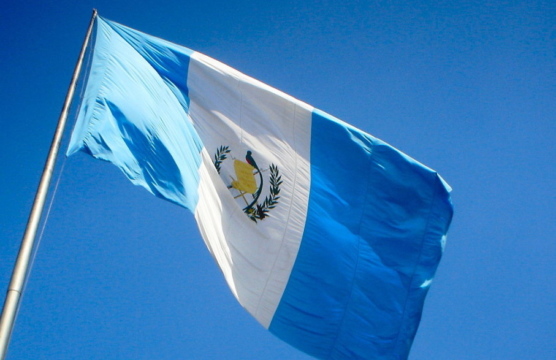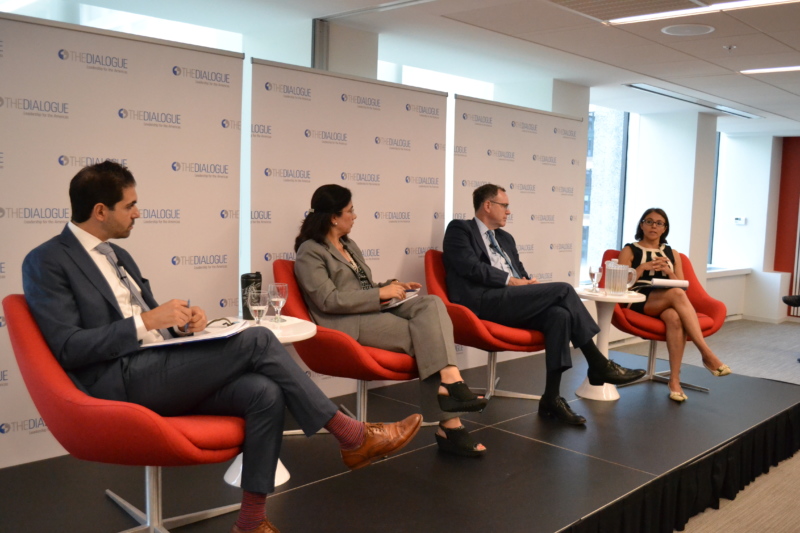
Are Countries Making Progress in Fighting Corruption?
Which countries in the region are making strides in fighting corruption, and which are falling short?
On Thursday, August 31st, The Dialogue hosted a conversation about corruption, impunity, and the ongoing political crisis in Guatemala stemming from President Jimmy Morales’ attempt to fire Iván Velásquez, the commissioner of the UN-backed International Commission Against Impunity in Guatemala (CICIG). Michael Camilleri, the director of the Peter D. Bell Rule of Law Program was joined by John Creamer, Deputy Assistant Secretary of State for Cuba, Mexico, Central America, and Western Hemisphere Regional Economic and Policy and Summit Issues; Claudia Escobar, Former Guatemalan Court of Appeals magistrate and Fellow at the National Endowment for Democracy; and Adriana Beltran, Senior Associate for Citizen Security at the Washington Office on Latin America.
Over more than a decade, CICIG has led successful corruption investigations against figures in government, business, and organized crime, including then-President Otto Pérez Molina in 2015. While CICIG has long fought against critics in Guatemala’s political elite, the current crisis emerged after it was announced that investigators were probing financial irregularities on the part of Morales’ presidential campaign. Seemingly in response, Morales declared Velásquez Persona Non Grata—although the Guatemalan Constitutional Court subsequently declared the action as void through an injunction. Nevertheless, Morales’ actions have meant uncertainty for his presidency and Guatemalan democracy.
In her remarks, Adriana Beltrán argued that it is important for the international community to show strong support for Velásquez. That support can help reinforce Velásquez’s already-strong position in the country and ensure that CICIG’s mandate continues to be strengthened. She cautioned, however, that is significant to watch future actions to ensure that the executive and other branches of government abide by the Constitutional Court’s ruling.
Live now: #GuatemalaDialogue w/ @Adriana_WOLA, @ClaudiaEJueza, John Creamer of @WHASpeaks & @camillerimj https://t.co/mZDeB5EFxX
— The Dialogue (@The_Dialogue) August 31, 2017
When asked about the current situation, Escobar argued that the elections for Attorney General and various magistrates—which occur every five years—might add some uncertainty to the political crisis. She also said that the civil society plays a key role, but it is now divided, as it is not strong as it was merely two years ago. When asked if this crisis is a zero-sum game, the former magistrate answered that it is possible for both Mr. Morales and Mr. Velazquez to survive if the President clears questions against him and respects the ruling of the court. However, actions like Morales’ have no precedent. Previous presidents have been reluctant to keep CICIG and have criticized it, but none have attempted to expel its top official.
In his comments, Creamer stated that dramatic changes are not expected in Guatemala's foreign policy and the United States is prepared to continue its work with Guatemala, as the Trump administration wants to see a strengthening of Guatemala's democratic institutions. He also agreed that there should be a strong focus on the private sector as a contributor to economic development and as a force to call for more transparency and anti-corruption. When the panel was asked about US leverage, he declined to discuss specifics.
Beltrán, however, pointed out that the US assistance packages to Guatemala include some strict conditions, including respect for the independence of the judiciary and the Attorney General's office and support for the mission of CICIG.
In closing, Creamer reassured the audience that the US has good relations with many different actors in Guatemala, and the administration will continue to use its influence to support CICIG and Velásquez, as they have played important roles in the improvement of security in Guatemala and ultimately in its economic development.
Which countries in the region are making strides in fighting corruption, and which are falling short?
Organized criminal groups pose an increasing risk to democracy and the rule of law in El Salvador.
Over the past weeks, public discontent with the administration of President Dilma Rousseff has continued to rise.
 Ben Raderstorf / Inter-American Dialogue
Ben Raderstorf / Inter-American Dialogue
 Video
Video